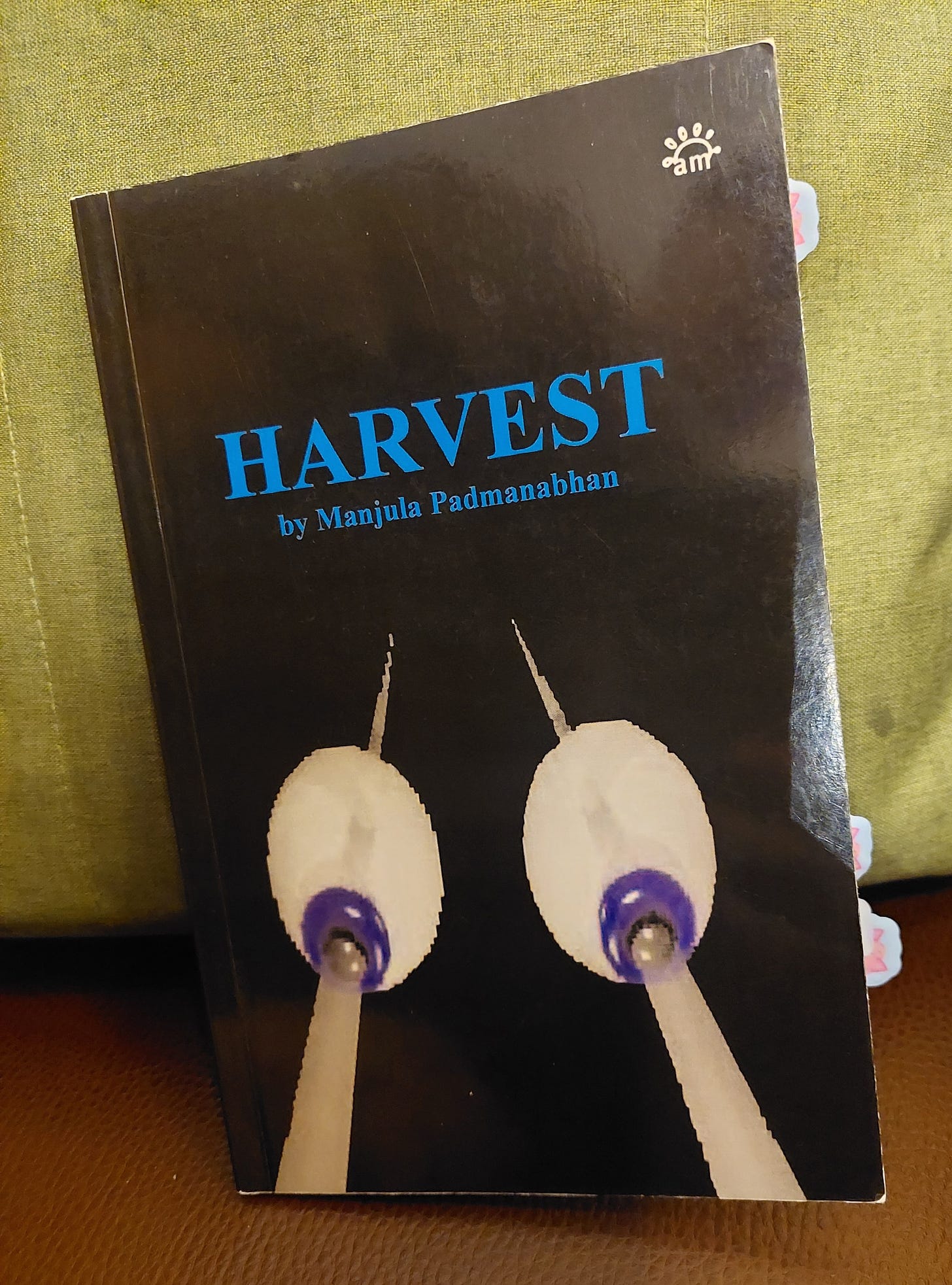I feel like I don’t see a ton of sci-fi scripts. Theatre does a great job with fantasy, imagination, and history, but science fiction just doesn’t seem to come up as often. Maybe that’s why I cling to cool sci-fi scripts when I find them. Harvest by Manjula Padmanabhan is one of those scripts. In spite of the cursed cover art on my copy, this script’s imaginative story and unique challenges keep me coming back for more. Let me tell you about it!
Harvest was written in the late 90s and inspired by the exploitative organ trade in Southeast Asia at the time. It’s set in 2010 and follows a low-income family in which the breadwinner, Om, has recently signed up to be an organ donor for a wealthy Westerner whose digital avatar is installed directly into the family living room. Ginni, the Receiver, sends the family impractical and extravagant gifts as they wait in their ever more crowded apartment for the inevitable day when Om will have to hand over one or more of his vital organs. Tensions run high as the family blames one another for the exploitation that is clearly coming from their wealthy ‘employers.’
Some other details:
Genre: Dark Comedy, Satire, Science Fiction
First Production: 2000
Cast: 4 men, 4 women
Ideal Performance Space: Black Box, Proscenium
Good Roles for Young People: Yes
Passes the Bechdel Test: I don’t think so
Themes: India, World Theatre, Dystopian, Organ Trade, Colonialism, Globalization, Exploitation, Centers female characters, Centers characters of color
Major Dramatic Question: What happens when the Receiver finally comes for Om’s organs? What does their relationship mean?
What was the playwright trying to do? Was she successful?
It seems to me like Padmanabhan was trying to do a variety of things. Most noticeably, she calls attention to the power imbalance between “the West” and impoverished people of the Global Majority. This, I think, is very successful, and remains relevant today. I don’t know what the state of legal or illegal organ purchasing is, but countries like the US that rely heavily on technology are certainly using up more than their/our share of global resources.
Padmanabhan also writes science fiction regularly, and in this case, she makes an attempt to translate that style to the stage. While she mentions in the introduction to this play’s Kindle version that the play was originally labeled ‘unproduceable’ because of those science fiction elements, many university theatre departments have proven those doubters wrong. This is certainly a successful and imaginative science fiction play which I believe could be exciting to bring to life onstage, with enough resources and creative energy.
Why this play now?
I find many plays from the 90s to be somewhat insufferable, but this one holds up incredibly well and certainly speaks to issues the world is facing today. As I mentioned, highly developed countries’ destruction of the environment affects developing countries much more than it affects countries like the US. This play shows similar exploitation on a very accessible human level, and some carefully placed dramaturgy could make the connection clear and effective for US audiences.
The play is also very producible. Most of the characters are in their late teens, and Padmanabhan encourages directors and producers to change the names and references to apply to any area rife with economic disparity. With a little imagination, this makes casting quite doable. The action also takes place on a single set which is intended to be cramped, so there’s no need for an elaborate space. The biggest challenge is probably the sci-fi creativity required from the set, lighting, and prop teams. This could be an exciting project for students or other artists in these areas — I see this as a pro, not a con.
This is a fascinating play, and I hope you get the chance to check it out! Shoutout to Josh Saboorizadeh for introducing it to me in the first place!
Next Up on My Reading List:
Usual Girls by Ming Peiffer
27 Short Plays About Being Murdered in a Hotel by ABBA by William Razavi
In Every Generation by Ali Viterbi
What else should I read? Drop me some sweet recs in the comments!




